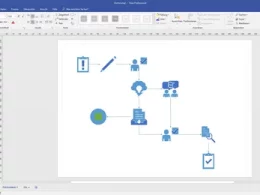Are you ready for a revolution in the business world? The rise of intelligent automation is shaking up traditional practices and redefining how we approach work. With the power of artificial intelligence, businesses are automating tasks once thought impossible, increasing efficiency, and enhancing customer experiences. In this blog post, we’ll explore how AI is disrupting traditional business practices and what it means for the future. Get ready to be amazed by what intelligent automation can achieve!
What is AI?
AI, or artificial intelligence, is a branch of computer science that deals with the creation of intelligent agents, which are systems that can reason, learn, and act autonomously. AI has been used in a variety of fields including gaming, natural language processing, and robotics.
In recent years, AI has made significant advancements due to increases in computing power and data availability. This has led to the development of new techniques such as deep learning, which is a type of machine learning that allows computers to learn from data without being explicitly programmed.
Deep learning is powering many of the current breakthroughs in AI such as self-driving cars, image recognition, and machine translation. As AI continues to evolve, it is expected to have a transformative impact on businesses and society.
What is Intelligent Automation?
Intelligent automation (IA) is the application of artificial intelligence (AI) technologies to automate tasks that traditionally have been performed by humans. IA can be used to automate a wide variety of business processes, including customer service, marketing, sales, and accounting.
IA is already having a significant impact on traditional business practices. For example, many companies are using chatbots to provide automated customer service. Chatbots are AI-powered software programs that can mimic human conversation. They are often used to handle simple customer service inquiries, such as providing product information or resetting a password.
In addition to chatbots, companies are also using AI-powered software to automate other tasks, such as marketing and sales. For example, some companies are using AI-powered software to create targeted marketing campaigns and to identify potential customers. AI-powered sales software can also be used to generate leads and to close deals.
IA is expected to have a major impact on the workplace in the coming years. Many jobs that have traditionally been performed by humans will likely be automated by IA technologies. This could result in substantial job losses in certain sectors of the economy. However, it is also possible that IA will create new types of jobs that did not previously exist
The Benefits of Intelligent Automation
As the world grows more complex, businesses are increasingly turning to intelligent automation to help them streamline operations and get ahead of the competition. Intelligent automation refers to the use of Artificial Intelligence (AI) and other advanced technologies to automate business processes. This can include tasks such as customer service, accounting, marketing, and even product development.
There are many benefits of intelligent automation for businesses. Perhaps the most important is that it can help businesses improve their efficiency and bottom line. By automating repetitive and time-consuming tasks, businesses can free up employees to focus on more strategic work. Additionally, intelligent automation can help businesses improve their customer service by providing faster and more accurate responses to customer inquiries. Moreover, automated systems can often work 24/7, which can help businesses boost their productivity.
Another benefit of intelligent automation is that it can help businesses reduce their costs. Automated systems often require less maintenance than manual ones, and they can run at a lower cost since they don’t need breaks or vacation days. Additionally, automated systems tend to make fewer errors than humans, which can save businesses money in the long run.
Finally, intelligent automation can also help businesses stay ahead of the competition. As more and more businesses adopt AI and other advanced technologies, those that don’t will likely fall behind. Intelligent automation gives businesses a way to maintain a competitive edge by automating key processes and staying ahead of the curve.
The Risks of Intelligent Automation
The Risks of Intelligent Automation
Despite the many potential benefits of intelligent automation, there are also some risks associated with its adoption. One of the biggest risks is that automating tasks can lead to job losses. In some cases, this may be a good thing (if the jobs are low-quality or dangerous), but it can also lead to economic hardship for workers who are replaced by machines.
Another risk is that automated systems may not work as intended, or may be vulnerable to hacking or other malicious attacks. This could cause serious disruptions in businesses or even critical infrastructure like power grids or transportation networks. Additionally, automated systems may inadvertently perpetuate bias, if they are not properly designed and trained. For example, facial recognition systems have been shown to be less accurate at identifying people of color than white people.
Finally, there is the risk that intelligent automation will be used for nefarious purposes, such as mass surveillance or control. As these technologies become more ubiquitous and sophisticated, it will become increasingly difficult to protect against abuse.
How to Implement Intelligent Automation
In order to take advantage of intelligent automation, businesses need to understand how AI can be integrated into their existing systems and processes. Here are a few tips on how to do this:
1. Start with a pilot project: Pick a specific task or process that can be automated and test it out on a small scale. This will help you understand the potential of AI as well as any challenges you may face when implementing it more broadly.
2. Work with an AI partner: Find a company that specializes in AI and has experience helping businesses automate their processes. They can help you select the right tools and implement them in the most effective way possible.
3. Train your employees: Your employees will need to be comfortable using the new AI-powered tools and processes. Make sure to provide adequate training so they can make the most of the technology.
Conclusion
Intelligent automation is revolutionizing the way businesses operate and manage their day-to-day operations. From customer service to finance, AI technologies are providing companies with new opportunities for innovation and efficiency gains. By leveraging these tools, businesses can increase productivity, reduce costs, and improve customer satisfaction. As intelligent automation continues to evolve, it will no doubt continue to disrupt traditional business practices in a positive manner that benefits everyone involved.











